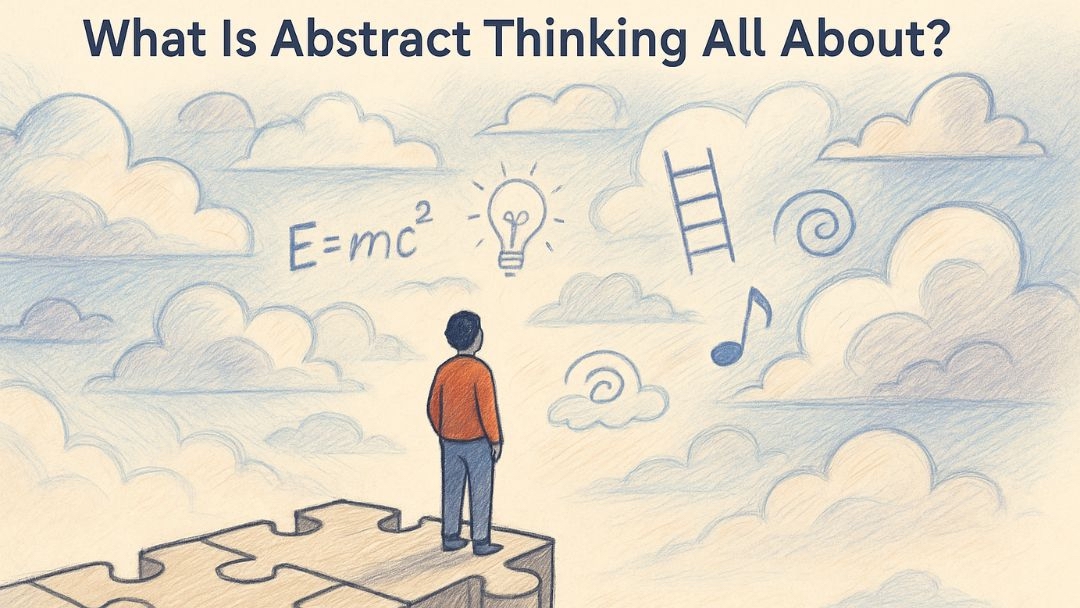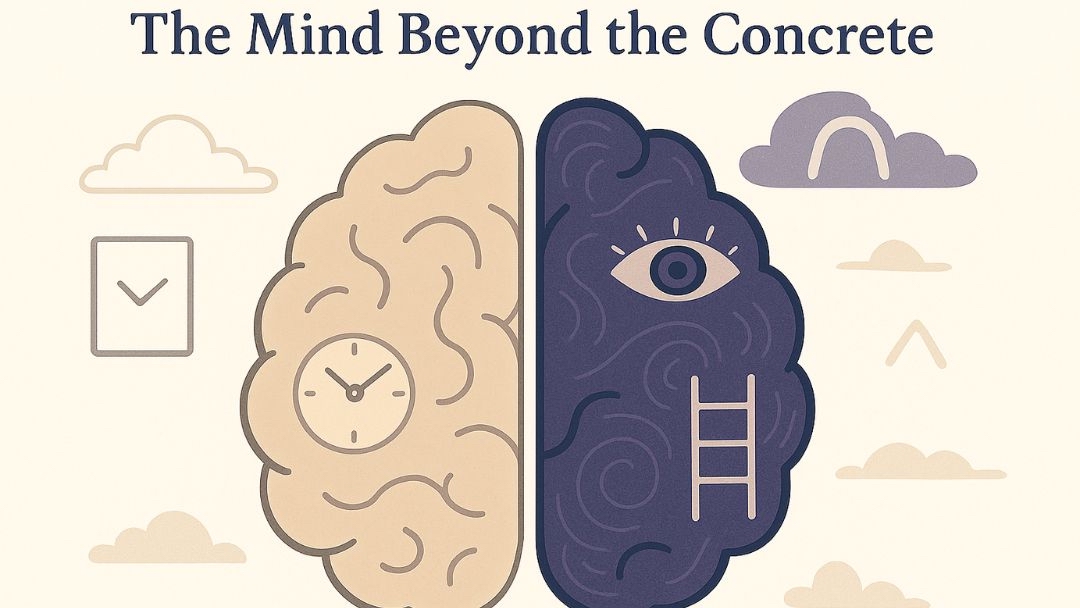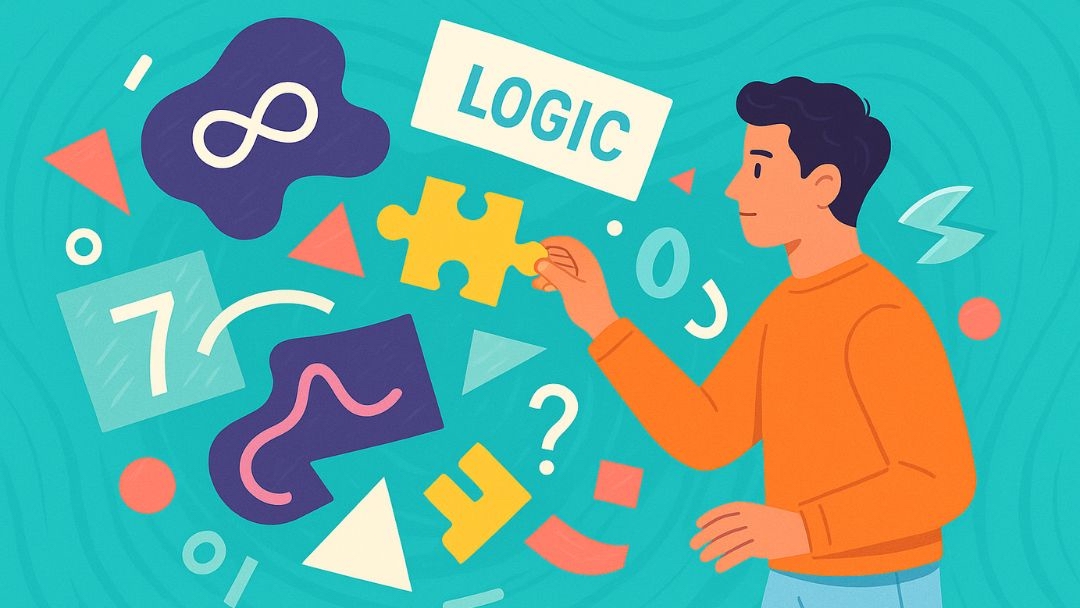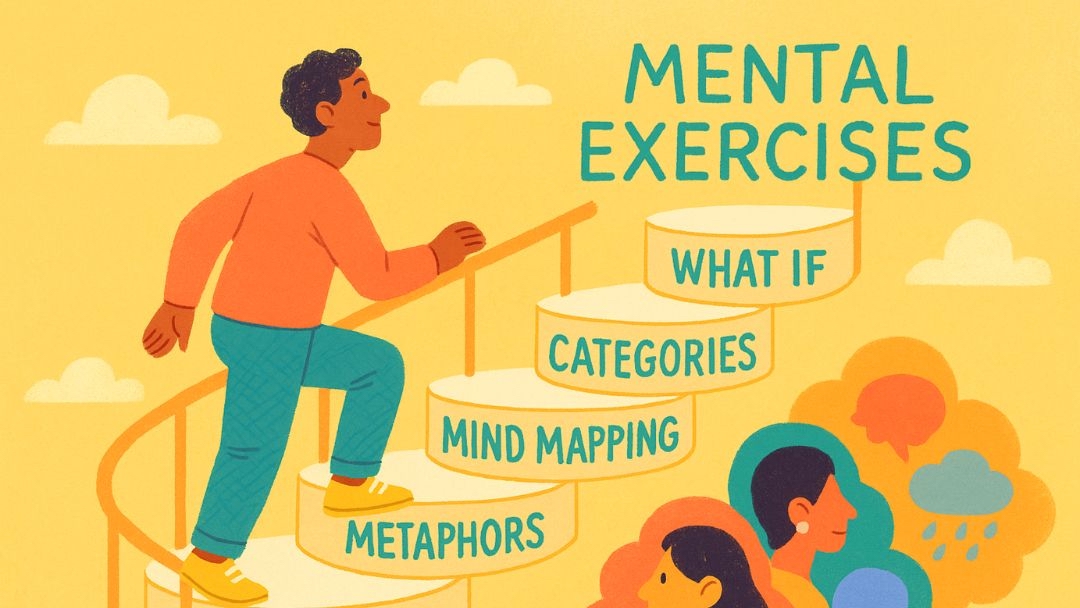Abstract Thinking Explained: Why It’s Key to Creativity, Problem-Solving & Perspective
Abstract thinking isn’t just for philosophers. It’s your brain’s ability to work with big ideas like justice or time—things you can’t touch but deeply understand. In this article, you’ll learn what abstract thinking really is, how it fuels creativity and problem-solving, and how to strengthen this skill in everyday life.


Back
8 mins read
Have you ever found yourself staring at a problem, but instead of zeroing in on the obvious, your mind starts connecting dots that no one else sees? Or maybe you catch yourself daydreaming about possibilities, ideas, or “what ifs” rather than just facts in front of you?
If that sounds familiar, chances are you’re tapping into a powerful mental skill called abstract thinking — even if you’ve never heard the term before.
I’ll admit something: for the longest time, I thought abstract thinking was just some lofty intellectual concept meant for philosophers and math geniuses. You know, the kind of thing that sounds smart but doesn’t really apply to day-to-day life.
But then I noticed something.
The most creative problem-solvers I knew, the friends who came up with unconventional ideas at work or interpreted things beyond face value—they weren’t just "smart." They thought differently. They connected dots I didn’t even know existed. And when I started paying attention to how they processed the world, it hit me: this is abstract thinking.
And it turns out, we all use it. Whether we're wondering why someone acted the way they did, brainstorming new ways to save money, or even reading fiction, we’re engaging in abstract thought.
So, what exactly is abstract thinking? Why does it matter? And how can we use it to make better decisions, solve problems, and foster creativity? That’s what we’re diving into.
Abstract Thinking Defined

Abstract thinking is the ability to think about concepts, ideas, and possibilities that aren't physically present or directly observable. It means working with abstract concepts like freedom, love, justice, or time—things you can’t see or touch but understand deeply.
In simpler terms, abstract thinking lets us deal with intangible concepts and see the big picture. It helps us think about theoretical concepts, imagine possibilities, and connect ideas that go beyond the here and now.
When you think about “justice,” you’re dealing with an intangible concept. There’s no single object you can point to and say, “That’s justice.” Instead, justice is an idea — it requires abstract thought to grasp. That’s why we say abstract thinkers can grasp complex concepts without needing tangible examples and can think about situations from multiple perspectives.
It’s also the foundation of creative intelligence. While abstract thinking helps us understand big ideas, creative thinking builds on that by generating new ones. So if abstract thought lets you recognize patterns or possibilities, creative thinking asks, “What else could this be?” or “How could I do this differently?” They’re not the same, but they work hand in hand—especially when solving problems or coming up with original ideas.
Examples of Abstract Thinking
To make this idea more concrete (ironically), here are a few everyday examples of abstract thinking in action:
- Interpreting a friend’s silence as a sign they might be upset, rather than just assuming they’re tired or distracted.
- Imagining what your life might look like in five years and setting goals based on that vision.
- Thinking about time not just as hours and minutes, but as something you want to “spend wisely” or “make the most of.”
- Using humor or sarcasm to convey meaning beyond the literal words being said.
- Seeing a job as part of a larger purpose—not just a paycheck, but a way to make an impact or express your values.
These examples show how abstract thinking lets you read between the lines, imagine possibilities, and find meaning that isn’t spelled out. It’s not limited to academics or artists—it shows up in how we think, feel, and make decisions every day.
The Science Behind Abstract Thinking: How Our Brains Make the Leap

Our capacity for abstract thinking develops throughout our lives, becoming particularly pronounced during what developmental psychologist Jean Piaget called the formal operational stage, which typically begins around age 11. During this stage, we develop the ability to think hypothetically, consider multiple perspectives, and reason with abstract concepts.
Neurologically speaking, abstract thinking involves various regions of the brain working in concert, particularly the prefrontal cortex—the area responsible for complex cognition and decision-making. When we engage in abstract reasoning, our brains form connections between different neural networks, linking disparate pieces of information into coherent patterns and insights.
Research suggests that abstract thinking isn't just a single skill but rather a collection of cognitive abilities that include:
- Pattern recognition
- Symbolic thinking
- Hypothetical reasoning
- Analogy formation
- Conceptual categorization
These cognitive processes work together, allowing us to transcend concrete reality and explore ideas that exist only in our minds. The development of these skills represents a significant evolutionary advantage, enabling humans to plan for the future, solve complex problems, and create innovations that have transformed our world.
Key Benefits of Abstract Thinking

Abstract thinking offers numerous advantages that can enhance virtually every aspect of our daily lives. Here are key benefits you'll experience when you strengthen your abstract thinking abilities:
1. Enhanced Problem-Solving Capability
When you’re stuck on a tough problem, abstract reasoning skills help you step back and see the bigger picture. Instead of getting bogged down in details, you can explore multiple solutions, weigh hypothetical outcomes, and find paths others might overlook. For instance, if you’re trying to solve problems at work, abstract thinking might lead you to rethink the entire process rather than just tweaking what’s broken.
2. Boosts Creativity
Creativity thrives on the ability to combine abstract ideas and imagine new possibilities. Abstract thinkers tend to see beyond surface details and experiment with intangible concepts, like themes, emotions, or metaphorical connections. For example, when a writer develops a story around abstract themes like freedom or identity, they’re exercising strong abstract thinking abilities.
3. Better Emotional Intelligence
Understanding abstract concepts like emotions requires looking beyond concrete behaviors to grasp intangible feelings and motivations. Abstract thinking helps us interpret emotional cues, understand complex social dynamics, and develop empathy by allowing us to imagine others' perspectives, even when their experiences differ dramatically from our own.
4. Stronger Learning and Adaptation
Abstract thinkers excel at identifying underlying principles that can be applied across various situations. This ability to extract and transfer knowledge makes learning more efficient and adaptation to new circumstances smoother. I've found that this skill has been invaluable when switching between different projects or roles, as I can quickly identify patterns and apply relevant principles from past experiences.
Can You Develop Abstract Thinking Skills? (Yes, & Here’s How)

Like any cognitive ability, abstract thinking can be strengthened through deliberate practice. Here are seven practical exercises to help you develop stronger abstract thinking skills:
1. Play with Metaphors and Analogies
Challenge yourself to describe concepts using metaphors. For example, explain how a computer works using a library analogy, or describe your job using only cooking terms. This exercise forces your brain to find connections between seemingly unrelated domains (a dimension of linguistic intelligence).
Try this: Pick an everyday object and spend five minutes writing down as many metaphors for it as possible. How is a pencil like a bridge? How is coffee like a symphony?
2. Engage with Art and Literature
Abstract art, poetry, and fiction often require us to look beyond literal meanings to understand deeper themes and symbolism. Regular engagement with these forms of expression exercises your abstract thinking muscles.
Try this: Select a poem or abstract painting and write three different interpretations of what it might represent or mean.
3. Practice Categorization with a Twist
Instead of grouping items by obvious characteristics (like color or size), challenge yourself to create categories based on more abstract qualities or uses.
Try this: Take 15 random household objects and group them in three different ways based on increasingly abstract criteria (e.g., first by physical properties, then by emotional associations, then by philosophical concepts they might represent).
4. Adopt Different Perspectives
Instead of just reflecting on your own thoughts, deliberately viewing situations through others' eyes helps develop cognitive flexibility—a key component of abstract thinking.
Try this: For a current challenge you're facing, imagine how five completely different people would approach it. How would a child see it? A historian? An artist? A scientist? A philosopher
5. Engage in Mind Mapping
Take a big idea — say “success” — and map out all the abstract ideas connected to it: happiness, freedom, risk, failure, and so on. Seeing the relationships visually strengthens your ability to think in abstract terms.
Try this: After mapping out your own web of ideas around how society defines success, circle the ones that feel most true to you. What patterns do you notice?
6. Find Patterns in Unrelated Events
Train yourself to spot connections and patterns across different domains of your life.
Try this: At the end of each day, identify three seemingly unrelated events and challenge yourself to find meaningful connections or patterns between them.
7. Ask “What If?” Questions
Abstract thinking flourishes when we move beyond accepted premises to consider alternatives. Pushing your imagination by playing with hypothetical situations trains your brain to explore possibilities beyond the concrete present.
Try this: Select a "common knowledge" belief you hold and spend fifteen minutes questioning its validity. What if the opposite were true? What evidence supports or contradicts it?
Abstract vs. Concrete Thinking: What’s Your Style?

You might have wondered if you’re an abstract or concrete thinker — and the truth is, most of us use both styles depending on the situation.
Imagine you’re looking at a painting. A concrete thinker might focus on the physical details: the colors, the brushstrokes, the canvas. An abstract thinker might see the emotions, themes, or story behind the painting—maybe it’s about freedom or loss, even if those ideas aren’t physically present.
Here’s a quick breakdown:
- Concrete thinkers excel at dealing with facts, routine tasks, and immediate realities. They prefer clear, straightforward answers. For example, concrete thinkers think about the apple on the table — its color, shape, or taste.
- Abstract thinkers lean toward ideas, theories, and conceptual thinking. Example: “An apple symbolizes knowledge or temptation.”
Finding your personal balance between abstract and concrete thinking styles can enhance your effectiveness across different situations. If you tend to be more concrete, practicing abstract thinking can expand your creativity and problem-solving abilities. Conversely, abstract thinkers can benefit from grounding themselves occasionally in concrete facts to avoid getting lost in theory.
Abstract Reasoning and Intelligence

You may wonder, "Is abstract thinking just another way to size up someone's intelligence?" In many ways—yes, but it's not the whole story.
Abstract reasoning, a key component of abstract thinking, is often tested in IQ tests and problem-solving tasks. Skills such as mental object rotation, tackling math problems, and complex language usage all require abstract reasoning skills. Also, depending on how well you can manipulate concepts in your mind translates to mental flexibility that's often linked to higher IQ.
It’s actually a big player in fluid intelligence—your brain’s ability to solve new problems without relying on past knowledge. (Think of it as brain agility.) This is also why people who are considered gifted or exceptionally creative tend to shine here. They see possibilities and connections others might miss. On the flip side, individuals with certain learning and intellectual disabilities or an extremely low IQ may struggle with abstract reasoning—often needing more concrete explanations or help translating complex ideas into simpler ones.
So yes, abstract thinking and intelligence go hand in hand. It’s not the only sign of being smart, but it’s definitely a strong clue your mind enjoys playing with ideas, not just memorizing them.
Abstract Thinking and Personality: Are Some People More Wired for It?

Absolutely. Our propensity for abstract thinking can be influenced by our personality traits. Intuitive, introspective types often lean more into abstract thinking. For example:
- People high in the Big Five openness to experience personality trait typically enjoy exploring theoretical concepts and tend to think more abstractly.
- In the Myers-Briggs Type Indicator (MBTI) framework, individuals with an "Intuitive" (N) preference—such as INFPs, ENTPs, or INFJs—tend to favor abstract thinking. They focus on patterns, possibilities, and meanings. Conversely, "Sensing" (S) types—like ISTJs or ESFPs—may lean towards concrete thinking, emphasizing facts and practical details.
- People with Enneagram Type 5 personalities (The Investigator) are naturally drawn to theoretical complex concepts and deep dives. Type 7s, on the other hand, use it to imagine endless possibilities—but often struggle to follow through.
Final Thoughts: Think Big, Think Abstract

Abstract thinking isn’t about being overly intellectual or getting lost in your head. It’s about being able to connect, create, and see beyond the obvious.
Whether you’re figuring out what kind of parent you want to be, how to navigate a difficult situation at work, or imagining a better version of your life—you’re using abstract thinking.
So don’t underestimate this skill. Strengthen it. Stretch it. Play with it. It might just be the mindset shift that helps you solve problems, see the big picture, and make more meaning out of the chaos that is modern life.


Return to Blog




